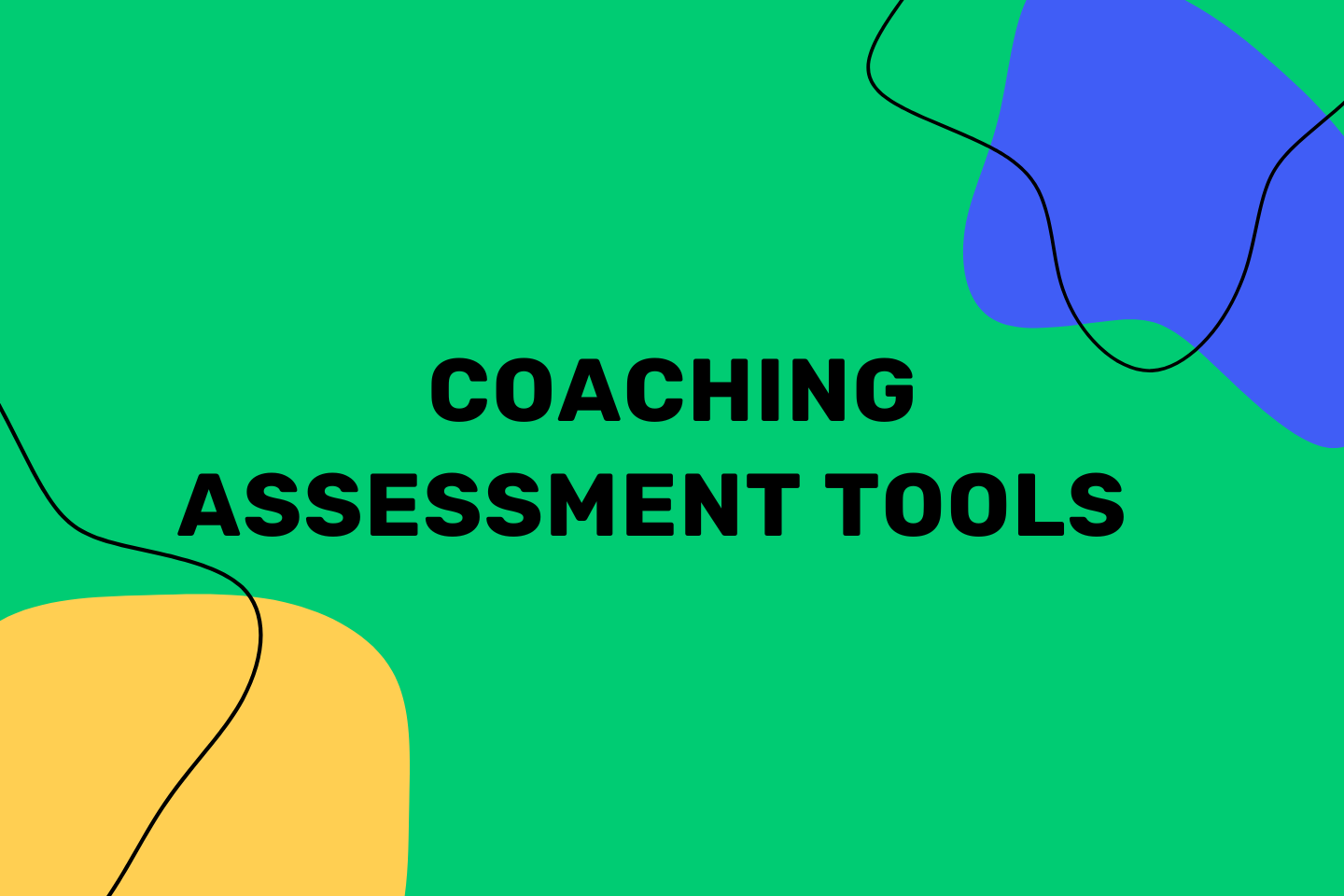There are plenty of different coaching assessment tools, but they all have different purposes. In addition, some are validated and backed by research, while others are essentially homemade tests that are often inaccurate.
So in this post, you’ll learn:
- Which official coaching assessment tools are commonly used in each coaching niche (business, leadership, and executive coaching)
- What each coaching assessment tool accomplishes
- What do you do with these coaching assessments once the client completes them
- Where you can find each coaching assessment tool
Let’s dive into it.
Life Coaching Assessments
The Myers Briggs Type Indicator
The Myers Briggs Assessment is a commonly used assessment that categorizes people as one of 16 different personality types.
Here are the 16 different personality types:
- ISTJ – The Inspector
- ISTP – The Crafter
- ISFJ – The Protector
- ISFP – The Artist
- INFJ – The Advocate
- INFP – The Mediator
- INTJ – The Architect
- INTP – The Thinker
- ESTP – The Persuader
- ESTJ – The Director
- ESFP – The Performer
- ESFJ – The Caregiver
- ENFP – The Champion
- ENFJ – The Giver
- ENTP – The Debater
- ENTJ – The Commander
There aren’t any right or wrong answers, but showing clients which category they fall under can help them be more self-aware, and you can tailor your communication style to that personality style.
We recommend giving this assessment at the beginning of every coaching relationship as it will help your client become more aware of their own character strengths and weaknesses, which you can develop throughout the engagement.
Here’s a link to a free MBTI test.
The Wheel of Life
The Wheel of Life is another life and career coaching assessment you can add to your coaching toolkit. It helps clients assess their goals based on five key areas of life:
- Health
- Relationships
- Finances
- Mindset
- Career
To incorporate the Wheel of Life into your coaching program, you can start each coaching session by asking clients to rate each area of the wheel on a scale of 1-10. Glancing at the Wheel of Life at the beginning of each coaching session ensures you always focus on the biggest challenges the client is struggling with and assign tasks accordingly.
For example, you can assign a journaling task if the client is struggling with mindset.
You can access a free Wheel of Life worksheet here.
5 Love Languages
Improving personal relationships can significantly elevate general life satisfaction and enhance personal growth.
So the 5 Love Languages, materialized by Gary Chapman, is an excellent assessment that every life coach should give at the beginning of the coaching engagement.
While it began as a theory, the 5 Love Languages has been tested by plenty of professional research organizations and is now a common life coaching assessment tool used in training programs worldwide.
The 5 Love Languages are:
- Words of affirmation
- Acts of service
- Gifts
- Quality time
- Physical touch
The assessment helps clients understand what actions make them feel appreciated and loved and improves their overall emotional intelligence.
This personality test is aimed at couples, but it’s also useful for improving professional relationships. If your clients can understand what makes their colleagues feel appreciated, they will likely become a highly valued team member, which can lead to promotions and professional growth.
You can access the free 5 Love Languages assessment here.
VIA Inventory of Strengths
This assessment is 240 questions and measures 24 essential character strengths that can be grouped into the following six broader categories:
- Wisdom and Knowledge
- Courage
- Humanity
- Justice
- Temperance
- Transcendence
The quiz is essentially a list of statements like, “I experience deep emotions when I see beautiful things,” and clients rate whether or not they agree with the statements on the 5-point Likert scale.
The VIA test helps you understand how your clients see the world, which enables you to coach more effectively.
VIA Inventory of Strengths test has been validated by researchers and is available for free.
Business/Executive Coaching Assessments
The Big Five
The Big Five assessment provides a score on five key personality factors:
- Openness
- Conscientiousness
- Extraversion
- Agreeableness
- Neuroticism
It was first introduced in the 1980s and is now a widely accepted assessment for coaching practices.
This tool helps your predict how clients/teammates might react in various situations so that you can approach problems through a lens that resonates with them. It’s also helpful for improving self-awareness and can be used as a personal development tool.
While it’s similar to the Myers-Briggs test, The Big Five provides results on a spectrum rather than limited binaries.
You can access the free Big Five test here.
Emergenetics
The Emergenetics Profile is a test that measures thinking and behavior patterns. It’s different from other profilers as it measures people across three different behavioral traits and four different thinking styles rather than just four areas.
The thinking styles are:
- Analytical Thinking: logical, skeptical, rational
- Structural Thinking: methodical, practical, cautious
- Social Thinking: connected, sympathetic, socially aware
- Conceptual Thinking: creative, visionary, intuitive
The behavioral traits are:
- Expressiveness: This is how intensely a person displays their emotions. On one end of the spectrum, a person is soft-spoken, while on the other end of the spectrum, the person is outgoing and social.
- Assertiveness: This is how firm someone is towards driving results. People on one side of the continuum are passive and easy-going, while those on the other side are driven and authoritative during the decision-making process.
- Flexibility: This is how easily a person can adjust to change. On the left side, people prefer a set routine and fight to keep that routine, whereas people on the other side are more willing to adapt.
By understanding your teammates’ thinking and behavioral patterns, it’s easier to assign roles and help them through challenging situations.
The Emergenetics Profile has been thoroughly researched and is considered a legitimate assessment test.
You can access the Emergenetics Profile for free.
Energy Leadership Index Assessment
The Energy Leadership Index Assessment (ELI) measures how a person perceives work and life.
So while the other assessment tools are designed to open a person’s eyes to their strengths and weaknesses, the ELI is designed to show how they perceive and approach their work and life.
In other words, this assessment shows people their attitude towards challenges rather than their strengths and weaknesses.
By helping your team understand a person’s attitude, you’ll be able to improve team collaboration and improve the company culture.
The ELI is available for free.
DiSC Profiles
The DiSC Profile helps teams better understand how to communicate with each other effectively and is used in Fortune 500 companies and small businesses.
The acronym stands for:
- Dominance: These people are confident and prioritize driving results
- influence: These people emphasize relationships and persuade the team
- Steadiness: These people are dependable, amiable, and great at working with others.
- Conscientiousness: These people emphasize producing high-quality results
As a leader, you can give this to all your team members and then have people share their results. This way, your teammates will be more aware of how everyone sees the world, which can promote better teamwork and reduce communication friction.
The DiSC profile also helps you be a more effective leader because you can assign appropriate roles to people based on their personality type.
Take the DiSC Profile assessment for free today.
Team Effectiveness Assessment
The Harvard Business Review released a Team Effectiveness Assessment that has been used among several healthcare organizations with great success.
This assessment aims to help leaders understand how effective their team is and evaluate the general culture and employee satisfaction.
Here are a few of the factors the Team Effectiveness Assessment measures:
- Team purpose
- Commitment
- Talent
- Norms
- Goals
- Morale
- Rewards
You and your team can take the Team Effectiveness Assessment for free on HBR.org.
Selecting a Coaching Assessment Tool
These coaching assessment tools aim to help your new clients learn more about themselves and help you be a better coach.
So before you get on a coaching call, ask them to fill out one of these assessments and review it to understand how they see the world.
If you use a coaching platform like upcoach, you can set the coaching assessment as a to-do and require them to complete it before they can schedule a coaching call.

